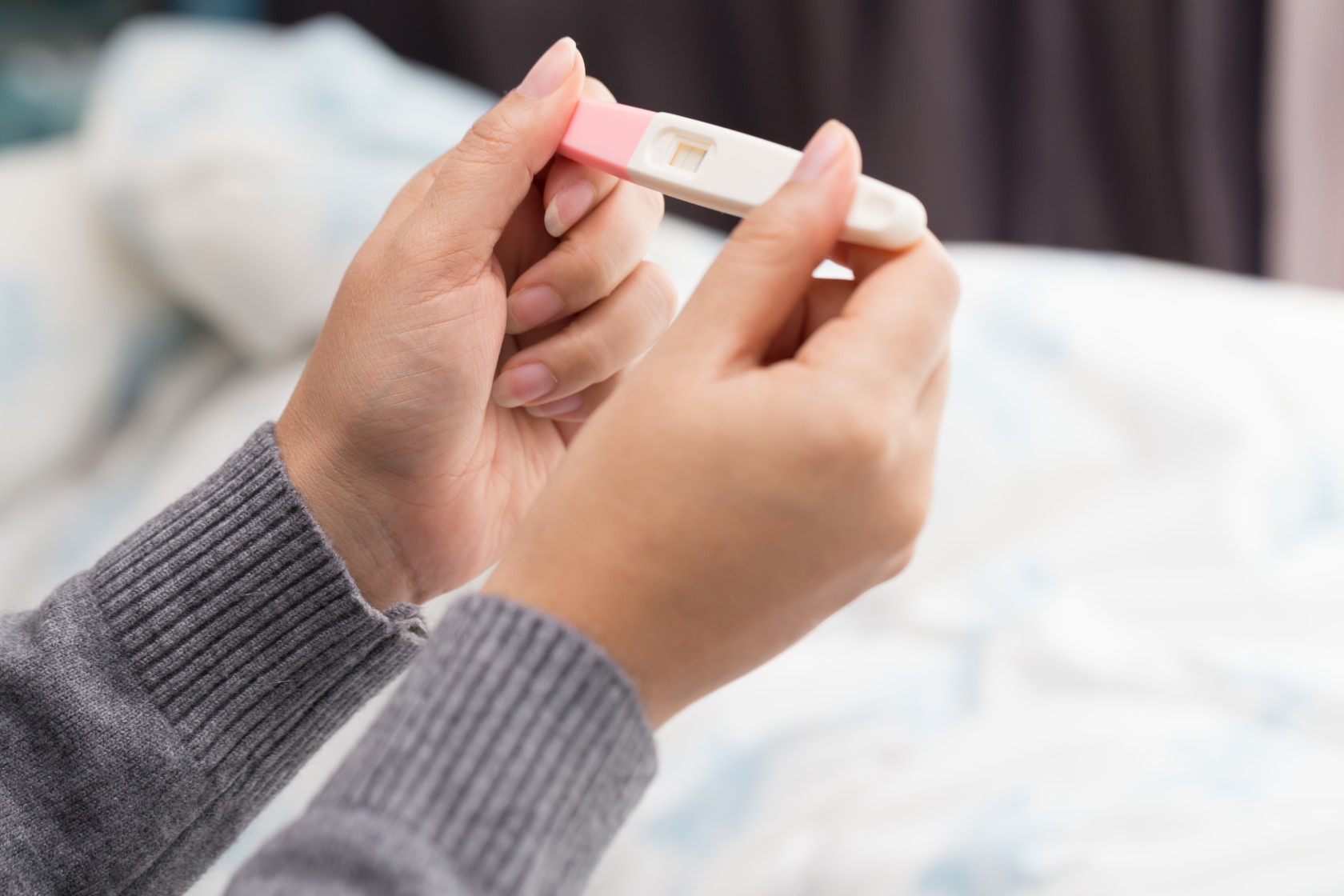I get lots of emails from young women wanting to know more about getting pregnant with PCOS. They’re not necessarily interested in getting pregnant just yet, but are eager to learn more about what they can expect from the process of trying to conceive (TTC) with PCOS in the future.
I originally didn’t have an answer to most of these questions, but I knew who would. So I first met Reproductive Endocrinologist Dr. Marc Kalan when he invited me to his Los Angeles fertility clinic to talk about PCOS and exercise. I had reached out to many of LA’s top fertility doctors in the hope of getting an interview, but Dr. Kalan was the only doctor to get back to me. He even joined me at the gym for a quick workout!
Right away I noticed that Dr. Kalan has a remarkable ability to present complicated information in a clear, non-threatening way. He can talk about delicate subjects, like infertility, with the perfect blend of honesty, empathy, positivity, and expertise.
If you would like to listen to a recording of some of my interview with Dr. Kalan, click here to get the MP3 sent to your inbox.

Q: I speak with many young women who have PCOS and know they would like to start a family someday. What can young women do to improve their chances of successful pregnancy later in life?
A: If you already have a PCOS diagnosis, there are several things you can do to get ahead of the curve so that you have the best chance of getting pregnant. The first is weight management. Maintaining a BMI below 30, ideally a BMI of 25, will make becoming pregnant and having a healthy pregnancy much easier.
Next, you should track your menstrual cycles. You don’t need to do this continually, but every so often you should track your cycles for a few months so that you have a general idea of how often you are ovulating.
Go to your general practitioner for yearly check-ups. Each year ask to be screened for diabetes, metabolic disease, and thyroid disorders. It is better to diagnose and manage these issues early so that you and your OB-GYN or Fertility Specialist are not surprised by a medical condition once you are ready to TTC.
Stay up-to-date on your vaccines. Common viruses like Chicken Pox or Whooping Cough can be devastating to a pregnancy. It is best to be immune to these viruses well before you try to get pregnant.
Q: When should women with PCOS see a fertility specialist?
A: That depends on two variables: age and your cycle.
This is why I recommend that you track your cycles before you are TTC. If you do not ovulate regularly, it is highly unlikely that you’ll conceive without some medical intervention to help you ovulate. If you already know that your cycles are irregular, you can save yourself much frustration by consulting with a specialist as soon as you are ready for that bundle of joy.
As I am sure your mother or some nosey relative has told you, age affects your fertility. I have some guidelines to help you factor age into your fertility equation:
- If you are younger than 32, have PCOS and regular cycles, consult a specialist after 3-6 months of trying to get pregnant on your own.
- If you are 32 years old or older, have PCOS and regular cycles, consult a specialist after only three months of trying. Older women are under tighter time constraints, so it is best to get help sooner rather than later.
Q: What can a woman expect from her first appointment with a fertility specialist?
A: When I meet with a patient for the first time, I focus on gathering and giving information. I want to learn all that I can about your health history and then explain your treatment options.
During your first visit, a fertility specialist will want to get an extensive health history. You can prepare for your visit by coming with some of this information on hand:
- Bring medical records from your general doctor (including vaccination records). If you have tracked your cycles, bring that information with you.
- Write down approximate dates for when certain health events happened, like your first period, and when you were diagnosed with any chronic conditions, like PCOS.
- Know your family’s health history. Does PCOS, diabetes, infertility, or miscarriages run in your family? You might need to ask an older relative about some of this.
Next you can expect a full exam. The exam will probably include:
- Blood tests to check your sex hormone levels, thyroid status, and risk of diabetes.
- A trans-vaginal ultrasound of your ovaries to evaluate your cysts.
- A physical exam to see how other PCOS symptoms present for you, like in your hair growth and acne patterns.
Once I have gathered all of this information, I like to sit down with a patient and have a long conversation about treatment options. Selecting a treatment plan for infertility can be an intensely personal decision, as finances, social support, religion and a person’s unique health history can all factor into the decision.
Q: What qualities will an ideal fertility patient have?
A: Self-knowledge is an important asset for any woman about to start fertility treatments. Ideally, a patient will know exactly what PCOS symptoms she has and will be able to share with her doctor all the steps taken to manage her symptoms.
Women need to understand that any fertility treatment will require more than just taking a prescription or undergoing a procedure. Lifestyle will play a huge role in how well a given fertility treatment will work. An ideal patient will come to her specialist motivated and prepared to make changes to her lifestyle to maximize the results of her treatment.
If you have a spouse or partner, they should be involved in the process too. Men, in particular, have a hard time understanding what a complicated and involved process TTC with PCOS can be. One way to get your partner engaged is to make sure they are informed. I recommend that partners attend fertility appointments along with the patient.
Q: Should you exercise while TTC?
A: Yes, patients can and should exercise while undergoing fertility treatments. Regular physical activity improves fertility in most women. In an ideal situation, a patient will already be following an exercise program when they come in for their first visit.
For patients who are not physically active, I advise against simultaneously starting a rigorous new exercise program and fertility treatments. The stress of making these two changes at once might become overwhelming. In some cases, I will delay treatments for a month so that a patient can start a moderate exercise program before they begin fertility treatments. However, that decision needs to be made on an individual basis as time might be a factor in your treatment plan.
Q: What fertility treatment options do women with PCOS have?
A: The treatment that I most commonly use for women with PCOS is a combination of ovulation induction and intrauterine insemination (IUI). I will prescribe a drug like Clomid or Letrozole, which will cause women with PCOS to ovulate. Once the patient is near ovulation, I perform IUI. IUI is the process of directly injecting sperm into your uterus. It is possible just to use ovulation and intercourse to conceive, but IUI increases the likelihood of getting pregnant.
Invitro Fertilization (IVF) is also a treatment option for women with PCOS. IVF involves stimulating ovulation, removing eggs from the woman’s ovaries via a surgical procedure and letting sperm fertilize the eggs in a laboratory. The fertilized egg is then implanted in the patient’s uterus.
A third, less common treatment option is a surgical procedure called ovarian drilling. Ovarian drilling is a laparoscopic surgical procedure where the surgeon will use a laser to puncture the ovary 4 to 10 times. 60% of women who have this procedure will begin to ovulate on their own. However, there are risks associated with ovarian drilling. One common complication is early menopause.
If you would like to hear Dr. Kalan explain these three treatment plans in detail, you can get the recording from our interview sent to your inbox.
Q: Are there any long-term side effects associated with fertility treatment?
A: In the 1980s, two studies linked Clomid use to ovarian cancer. The studies found that women who had fertility treatments were more likely to have ovarian cancer. Later, these studies were reevaluated and debunked. Further investigation discovered the link between being anovulatory and ovarian cancer was to blame. Women who sought fertility treatments were more likely to be anovulatory and, therefore, were more likely to seek fertility treatment than other women.
The bottom line for women with PCOS is this: fertility treatments seem to reduce the risk of ovarian cancer later in life. Anovulatory women are in greater danger of developing ovarian cancer. Fertility treatments cause anovulatory women to ovulate, therefore reducing their ovarian cancer risk.
Q: Will taking Metformin increase my fertility?
A: The studies on Metformin and fertility have not brought a conclusive answer to this question, but the results suggest that Metformin can be very useful during fertility treatments. This is especially true for women who are insulin resistant.
Insulin resistance can trigger a series of hormonal and metabolic imbalances that will make getting pregnant more difficult. Metformin is a safe and effective means of correcting insulin resistance. Before I prescribe Metformin, I evaluate a patient’s insulin sensitivity (through lab work) to determine whether Metformin will improve her chances of conception.
But Metformin may not be the right course of treatment for every woman with PCOS. Physicians should assess a patient’s insulin sensitivity and goals before prescribing Metformin or any other insulin-sensitizing drugs.
Q: Is Metformin safe to take during pregnancy?
A: Metformin is safe to take during pregnancy. In fact, Metformin is an extremely useful treatment for women who are diabetic or become diabetic during pregnancy.
Q: Should every woman with PCOS take Metformin?
A: Metformin is a safe, worthwhile treatment option for women who have PCOS and insulin resistance. If you do not have insulin resistance, Metformin will not be of much use to you.
That being said, many women with PCOS do have insulin resistance, even some lean women. You and your physician should thoroughly evaluate you insulin sensitivity, and use that information to create a treatment plan. I suggest that PCOS patients get tests for Hemoglobin A1c, fasting blood sugar, fasting insulin levels, and 2-hour glucose tolerance to evaluate their insulin sensitivity.
Q: Will the long-term use of birth control pills damage your fertility?
A: Birth control pills will not diminish your fertility. However, time will. All women experience a decrease in fertility as they age. If you come off birth control pills after several years and have a difficulty conceiving, age is the likely culprit.
Birth control pills can be a safe and effective part of a larger PCOS treatment plan. They can help women with PCOS manage their symptoms and regulate their cycles. I do recommend that women periodically go off birth control pills so that they can evaluate their natural cycles. In some cases, PCOS symptoms can decline as a woman ages and birth control may no longer be necessary to control her cycles and symptoms.
If you smoke, you should talk to your doctor about possible health risks associated with smoking and the use of birth control pills.
There you have it, ladies! I hope you feel informed and encouraged by Dr. Kalan’s tell-all. If you live in the Los Angeles area and are ready for that bundle of joy, get in touch with Dr. Marc Kalan and his colleagues at the Los Angeles Reproductive Center I am confident you will receive the top-notch care you deserve. In case you have not noticed, I’m a fan!
The LA Reproductive Center has locations in Westwood, Encino, Thousand Oaks, and Bakersfield.






